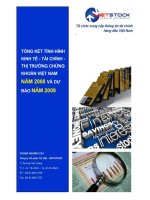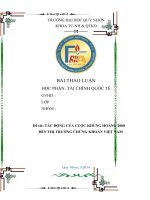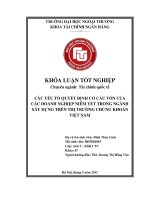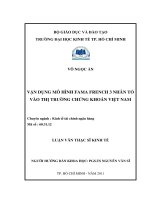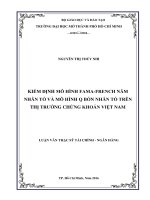SECURITIES MARKET IN VIETNAM FROM 2008 TO PRESENT
Bạn đang xem bản rút gọn của tài liệu. Xem và tải ngay bản đầy đủ của tài liệu tại đây (794.41 KB, 26 trang )
1
CONTENTS
A. INTRODUCTION
1.1 Reasons for choosing the topic
1.2 Study objectives
1.2.1. General objective
1.2.2. Specific objectives
1.3. Scope of the study
1.4. Research methods.
B. ANALYSIS
CHAPTER 1: THEORIES BASIS6
1.1 The concept, structure and role of the stock market
1.2 Classification of stock market
1.3 The holder may operate on the stock market
1.4 The principle of operation of the stock market
CHAPTER 2 : ANALYSIS OF THE SECURITIES MARKET OF VIETNAM
FOR THE PERIOD FROM 2008 TO PRESENT0
2.1. Vietnam stock market in 20080
2.2. Vietnam stock market in 2009.11
2.3. Vietnam stock market in the period from the year 2010 - 2014
2.4. Vietnam stock market in the period from 2015 - the first half of 2017
CHAPTER 3: SOLUTIONS FOR THE DEVELOPMENT OF VIETNAM
SECURITIES MARKET IN THE FUTURE23
C. CONCLUSION24
REFERENCES25
2
A. INTRODUCTION
1.1 Reasons for choosing the topic
The Vietnam’s economy joining the WTO (November 7, 2006) has developed
significantly. In that development, it was necessary to mention the financial
market, especially the stock market, which made a great contribution to the overall
development of the economy. Market scale has sharply increased over the years.
But from the end of 2007 to the present, the world and domestic economic
situation has a lot of fluctuations in exchange rates, fuel, natural disasters,
epidemics, especially the fluctuations of financial markets, because affected by the
world financial crisis originated from the financial crisis in the United States
(started in 2007 and officially boomed in 2008 then spread to other countries in the
world also in 2008).
Vietnam's financial market is also affected by the stock market. Typically, the stock
price continuously declines on the two exchanges in Hanoi and Ho Chi Minh City.
The bottom of the market was established at the end of the trading session on June
20, 2008 with 366.02 points. But on October 23, 2008, VN-Index officially broke
the record with 360.43 points. Thus, it caused great damage to the stability and
development of the Vietnamese economy. In order for the Vietnamese stock market
to overcome difficulties due to the global financial crisis and to develop
comprehensively and sustainably the stock market in the future, we must study the
problems that affect the stock market's decline to give the appropriate development
policies in the future.
Therefore, researching the topic "Analyzing the stock market in Vietnam from
2008 to now" is very necessary. It will give economists a more multidimensional
3
vision to take measures to develop the stock market as well as boost our country's
economy in the future.
1.2. Study objectives
1.2.1. General objective
Analysis of the situation following the Vietnam stock market from 2008 to the
present from which proposed solutions to develop Vietnam's stock market in the
future.
1.2.2. Specific objectives
- To analyze the operational status of the securities company Vietnam period from
2008 until now
- Analysis of factors affecting investors to participate in Vietnam's stock market in
this period
- Understanding the shortcomings that exist in the stock market. At the same time,
the stock market proves there is a strong impact on the economy of the country
- Offer solutions for stable and long-term development Vietnam's stock market in
the future.
1.3. Scope of the study
1.3.1 Scope of space (study area):
This study was performed within the State of Vietnam.
1.3.2 Scope of the time (period or time of the study):
Subject used data from 2008 - the first half of 2017
4
1.3.3 Research Subjects:
Subjects of the study subjects are love Figure Vietnam stock market (particularly
fluctuations in the VN-Index and HNX-Index HOSE HNX saw from 2008 present).
1.4. Research methods
1.4.1. The method of data collection.
Collect information, secondary data via the Internet, sales reports and journals...
are relevant to the subject. Then, process the information to have a panoramic view
on the subject of research.
1.4.2. The method of data analysis.
Statistical analysis method description and comparison of the secondary data were
collected from the situation of Vietnam stock market operations to implement the
goals of the subject.
5
B. ANALYSIS
CHAPTER 1
THEORIES BASIS
1.1. The concept, structure and role of the stock market
1.1.1. The concept of the stock market.
The stock market is a market that in the place that people buy to sell, transfer, stock
exchanges, the paper notes the medium and long term debt (usually from 1 year
and over) aims to make words.
In countries with developed market economy, the stock market was a market
concept has organized and controlled activity, was the purchase-sale of securities
between the medium and long term securities issuers and securities purchases or
sales of securities. The stock is the deed or the journal entry number to confirm the
rights and legitimate interests of the owner and can buy and sell, transfer on the
market.
1.1.2. The organizational structure of the stock market
From any one stock market of any country, whether newly established or
developed, it is constituted by a two-part market of the organizations different:
-The primary market (primary market) also known as stock market release, the first
phase of the stock market launch.
-Secondary market (secondary market) also known as the secondary market, where
the purchase - sale of securities issued on the primary market and is an important
part of the stock market, is inextricably linked with primary market.
1.1.3. The role of the stock market
6
Stock market play a role contributing to the development of the economy, creating
conditions to attract and control foreign investment, stimulate business enterprise
more efficient and healthier. The stock market is the immediate mobilization of
capital without affecting inflation and monetary policy implementation, the
evaluation tools business.
1.2. Classification of stock market
1.2.1. Based on the legal side, the stock market is divided into the following
categories
- Market transaction or transaction or a listed market focus
- Market focus - OTC market
- The third market
- The fourth market
1.2.2. Based on the location of release, the stock market is divided into two
types:
- The official stock market - Stock trading
- The informal stock market
1.2.3. Based on the method of trading, stock market is divided into two types:
- The market for immediate delivery
- Futures market
1.2.4. Based on the characteristics of the types of goods circulating on the
stock market, the stock market is divided into three types:
7
- Stock markets
- Bond market
- The market the stock origin tool
1.3. The holder may operate on the stock market:
The organizations and individuals involved in the stock market can be divided into
the following groups: the Publisher, investors and organizations related to
securities.
1.4. The principle of operation of the stock market:
1.4.1. Intermediate principle:
All the transactions, buying and selling securities on the stock market are made
through intermediaries, also known as the international model.Brokers trading on
the orders of customers and commissions. In addition, brokers can also provide
other services such as providing information and advice to clients in the
investment...
In principle intermediaries, investors can not directly deal with each other to buy or
sell securities. They are going through their brokers to place orders. The broker
will enter channels into the system for matching orders.
1.4.2. Auction principle:
Stock price is determined through the auction between the buy and sell orders. All
market participants are not able to intervene in the determination of this price.
There are two forms of the auction is a live auction and auction automatically:
- Direct Auctions is the broker met on the trading floor and live auction.
8
- Auto Auctions is the trading orders from the gender dimensions are entered into
the host system of the stock exchanges. The host system will determine the
premium for at this price, the stock trading at the highest volume.
1.4.3. The principle of publicity.
All the activities on the stock market shall ensure publicity. The stock exchange
announced the information on securities transactions on the market. The
organizations listed on the public disclosure of the financial information of the
company's annual, extraordinary events happen to the company, holding stocks of
the director, the manager, the majority shareholder.The information as is publicly
transparent, the more attracted investors to participate in the stock market.
9
CHAPTER 2
ANALYSIS OF THE SECURITIES MARKET OF VIETNAM FOR
THE PERIOD FROM 2008 TO PRESENT
2.1. Vietnam stock market in 2008
- The down trend was the main trend in 2008
- Vn-Index plunged 70%, Hastc-Index dropped below 100 points
- Investors on both HOSE and HASTC stepped up the sale of their shares to raise
capital
- Foreign investment in the stock market fell by nearly 50% compared to 2007
Graph 2.1: The performance of VN-Index and HASTC-Index in 2008
(Source: finance.vietstock.vn)
Factors affecting Vietnam's stock market in 2008:
10
- Strongly influenced by the world financial crisis
- The market tended to sell out so stock prices more and more decline
- State Bank implemented monetary policy tighted to control inflation were high
double digits. State banks implement monetary policy tightening, withdraw cash
from circulation that commercial banks lack of cash forced to raise interest rates to
mobilize capital. Due to high interest rates led many investors to exit the market.
They promote and sell shares in a bank depositor has highly profitable and secure.
2.2. Vietnam stock market in 2009
- Vietnam's stock market has quickly rebounded following the economic recovery
- The VN-Index increased 171.96 points from 312.49 to 494.77, equivalent to 58%
- Similar to the HASTC, the growth of HNX-Index was 60.9%
- Hanoi Securities Trading Center (HASTC) converted into a stock exchange
(HNX)
11
- Established UPCoM market for public companies registered to trade.
Graph 2.2.1: VN-Index's performance in the year 2009
(Source: finance.vietstock.vn)
Graph 2.2.2: HNX-Index's performance in the year 2009
(Source: finance.vietstock.vn)
12
Factors affecting Vietnam's stock market in 2009:
- Monetary and fiscal easing policies have been effective against the economic
downturn
- GDP growth of 5.32%, exceeding the plan
- Inflation target of less than 7%.
2.3. Vietnam stock market in the period from the year 2010 - 2014
In the period from 2010-2014, Vietnam stock market due to the impact of the
macro-economy, the influence of the great events in and outside the country,
so the stock market Vietnam in this period trends mainly sharp decline and
not much remarkable growth.
In 2010, the market was down after rising sharply 235 points to 630 points. The
decline and accumulation of the market made the whole market in 2010 almost
fluctuate in the 485 +/- 65 points. Ending the year at 484.66 points, the VN Index
has dropped 10.11 points, or 2% compared to 494.77 points as at 31/12/2009.
In summary, the main trend of 2010 was to go sideways and fall sharply. The
market received a new volume of listings and additional stock listing record.
13
Graph 2.3: The performance of VN-Index and HNX-Index in 2010
(Source: finance.vietstock.vn)
In 2011, this was a difficult year for Vietnam and the world economy, which has
had a negative impact on the Vietnamese stock market. For the whole year, the
market was barely rallied in two short rallies in late May and mid - August; the rest
of the market remained largely depressed in the boredom and fatigue of traders. At
the end of trading session on December 30, 2011, VN Index and HNX Index
closed at 351.55 and 58.74 points, respectively. Compared to early 2011, HOSE
dropped sharply by 27.46% while HNX slumped to over 48.6%
The liquidity of the stock market also fell sharply, compared with the number of
2010, the average value of each trading session of each floor slumped sharply to
approximately 60%.
- Securities companies were in trouble and bear a loss.
14
Graph 2.4: The performance of VN-Index and HNX-Index in 2011
(Source: finance.vietstock.vn)
- A 40% increased in the first five months of the year followed by a sharp drop in
the remaining seven months, Vietnam's stock market in 2012 resembling the
witch's poisonous apple in the story "Snow White and the Seven Dwarfs."
- August 21 - The day was considered "The Dark Tuesday" of Vietnam stock
market. Bank shares were sold floor continuously, the margin cut the market
almost plunged "not brake".
- For the first time, the VN30 and HNX30 were applied
- Compared to the peak in May, despite the strong recovery in December, VNIndex still dropped 20% and HNX-Index decreased 36%.
15
Graph 2.5: The stock index fluctuation in the year 2012
(Source: finance.vietstock.vn)
- The stock market has gone through a rather quiet year in 2013, not to face the
same scandal, as it did last year. In contrast, the market received positive macro
support such as the 30 trillion dong real estate bailout package and the bad debt
deal through the Vietnam Asset Management Company (VAMC), two this factor
helped the market prosper in the first half of the year.
- VN-Index increased nearly 23%; The HNX-Index surged more than 13%
compared to the end of 2012. Vietnam stock market was considered one of the
countries with the strongest recovery in the world.
16
Graph 2.6: The performance of VN-Index and HNX-Index in 2013
(Source: finance.vietstock.vn)
In 2014, this was a year of fluctuations with many unexpected events took place, if
the beginning of the year smoothly and the market rose "beautiful" help investors
pockets swell, from mid-year on many stock indexes “groggy”.
In particular, VN-Index dropped the strongest point of the year was 08/05, when
China put drilling platform in Vietnam's exclusive economic zone. In this session,
the VN Index has dropped to 32.88 points, representing 5.87% of the sharpest
decline in nearly 13 years, since 03/10/2001; The HNX-Index dropped 6.4% from
76.5 to 71.66.
17
Graph 2.7: The performance of VN-Index and HNX-Index in 2014
(Source: ndh.vn)
Factors affecting Vietnam's stock market in the period from the year 2010 2014:
- The stock market in the world distracted when affected by the European debt
crisis in 2008.
- The State Securities Commission (SSC) handled many manipulations of
securities prices
- The State Bank issued Circular 13 requiring banks to raise the capital adequacy
ratio (CAR) from 8% to 9%. Ensuring the safety factor has led many small banks
to raise capital race, creating a significant pressure on the stock market.
- World gold prices started to rise again and set a new record. At one point in just
over ten days time period, gold has rised a circuit from 32 million /tael to 39
18
million /tael, led many large profits in a short time only. Gold immediately became
an attractive investment channel, sucking money from the stock market part. The
explosion of the gold market was not only suck away a certain amount of capital
from the stock channels, but also create macroeconomic instability makes the stock
market more difficult.
- Along with that, macroeconomic appear signs of instability, concerns about
inflation and the devaluation of the VND has led many people "take refuge" in this
currency, causing demand to buy USD spike . USD exchange markets in early
November freedom at times has reached 21,500 VND / USD.
- Besides, the base rate was adjusted increase from 8% to 9%, pushing the interest
rate on the mobilization of commercial banks quickly increased. Again the sudden
change of monetary policy caused the stock market to be affected. VN-Index after
a long time passing have plummeted, losing more than 30 points only in the first
half of November, touching the lowest level, point 419.98 levels by the year 2010
on 22/11.
- In 2011, Inflation increased (up to 23%) instead of 4% as commercial banks
reported. The macro uncertainty about the banking system began to appear.
- Fiscal and monetary policies are tightened
- Savings deposits became an attractive investment channel with deposit rates of
18-20%, especially in the first September of the year, before the SBV stepped up
its discipline in the market
- Uncertainty of investors in the banking sector as bad debt increased in the second
half of 2011.
19
- The SBV's official announcement on the Non-performing Loan (NPL) ratio of the
whole system up to 10% in 2012.
- 2012 was probably the most policy reform year since the stock market was
established. Circular series was launched request securities companies as well as
the members of the market must strengthen information disclosure activities such
as:
• Circular 52 guiding information disclosure dated 5/4/2012 on the stock
market: the public company in which large scale must also disclose
information as listed firms
• Circular 121 guidance on governance companies apply to public companies
• Circular 165 amended Circular 226: reduced time special control company
stock from 6 months to 4 months, financial institutions closed and suspended
operations certified company securities not fix the situation under special
control
• Decree 58: improve standards listed on two exchanges
• Official dispatch 3229 banned the securities business organization allows
short selling across the system.
- Other investment channels such as savings, gold and real estate became less
attractive than stocks as a factor that helped cash flow into the market in the past
year
In 2014, a series of hot events such as China's drilling rigs in the South Sea, petrol
and oil prices continue to fall, the economic crisis in Russia...
2.4. Vietnam stock market in the period from the year 2015 – 2017
Vietnam stock market in the period from the year 2015 - 2017 was strong
growth especially in 2016. Thanks to the way innovation policy developed by
20
the Government, Vietnam stock market has changed far more superior
compared to the period from 2010-2014. This is considered good sign, making
the premise for the development of Vietnam stock market in the future.
In 2015, the total trading volume on the market reached nearly 39.7 billion shares,
worth VND 617 trillion, down 16.3% in volume and 15.8% in value translated by
2014.
On the HOSE, the VN Index gained 4.13% from the end of last year. On the HNX,
the opposite trend was witnessed when the HNX Index fell 4.62% compared to the
end of 2014 total trading volume in 2015 reaching over 11.55 billion shares (a
sharp decrease of 32% over 2014), the total transaction value also decreased 32.3%
to more than 135 trillion.
- Vietnam stock market in 2015 was relatively stable and is considered a bright
spot to attract indirect capital flows compared to other countries in the region.
Graph 2.8 Yuan's value versus the US dollar (Source: Forbes)
Closing in 2016, the stock market (Vietnam stock market) has quite positive
movements. Closing the last trading session of 2016, VN-Index stopped at 664.87
21
points, up 14.82% compared to the end of 2015.Meanwhile, the HNX-Index rose
slightly (0.2%) to 80.12 points. Along with the positive increase, liquidity of the
market also increased significantly compared to 2015. Notably, over 118
companies registered UPCoM transactions in the past year, bringing the total
number of enterprises on the floor to 408 enterprises, while the market
capitalization is four times higher than in 2015.
Graph 2.9: The performance of VN-Index and HNX-Index in 2016
(Source: finance.vietstock.vn)
As of July 3, 2017, the VN Index reached 778.88 points, up 17.1% from the end of
2016. The HNX Index closed at 100.33 points, up 25.2%.
Market capitalization reached VND 2,539.7 trillion, up 25.7% compared to end of
2016, equivalent to 56.4% of GDP. Average trading size was over VND 12,563
billion, up 32.5% against last year, of which bond trading reached VND 8,052
billion / session, up 25.2%; trading transactions, fund certificates reached 4,511
billion per session, up 48%.
22
- SSC has submitted to the Ministry of Finance and submitted to the Government
for permission to open the derivatives securities market in early August 2017.
Factors affecting Vietnam's stock market in the period from 2015 - the first
half of 2017:
- The government loosened room (ownership percentage) for foreign investors
- Stock market suffered strong negative impact from external factors make for a
very low growth
- The world events strongly influenced the Vietnam stock market: events Chinese
stock market day trading break April 1, Event UK leave the EU (Brexit) on June
24...
- IPO to the stock exchange has been greatly shortened.
- Donald Trump officially assumed office
in early 2017
- Took steps to implement investmentlinked products, offering products real
estate investment funds...
23
CHAPTER 3
SOLUTIONS FOR THE DEVELOPMENT OF VIETNAM
SECURITIES MARKET IN THE FUTURE
Firstly, improve the legal framework and improve management capacity.
Secondly, further promote equalization and divestment of state-owned
enterprises (SOEs) associated with the listing and registration of transactions;
Thirdly, prepare the necessary conditions to put into operation;
Fourth, improve and develop the bond market;
Fifth, develop and diversify investor base and improve demand;
Sixth, develop, improve the capacity of the market intermediary system;
Seventh, solutions to restructure market organization, infrastructure,
technology;
Eighth, continue to improve management efficiency, supervision of the stock
market and strictly handle violations.
C. CONCLUSION
24
The development of the stock market is very important to our country's economic
development. Before the current situation of the VN-Index changes, the
Government should set up and implement many solutions for strict management,
more drastic than before the fluctuations of the domestic economy in particular and
the world economy in general. Since then there are measures to help investors and
businesses develop sustainably. After 17 years of operation in general and follows
the ups and downs, the event due to the economic crisis in particular has brought
Vietnam's stock market experience and valuable lessons in dealing with crisis as
well as in building construction and development of the stock market, this is very
valuable in the years to follow-up activities of the Vietnam stock market.
REFERENCES
25



